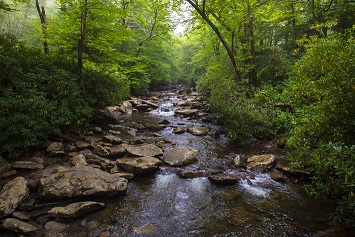With remarkable efficiency, less than 1 month after inauguration, Congress and President Trump came together to nullify the Stream Protection Rule (SPR, December 20, 2016, Federal Register), a major regulatory action 6 years in the making at the Department of Interior’s Office of Surface Mining Reclamation and Enforcement.
 |
At a White House ceremony on Thursday, February 16, the president signed House Joint Resolution 38 (https://www.congress.gov/bill/115th-congress/house-joint-resolution/38/text), which states that Congress disapproves of the SPR and that the rule “shall have no force or effect.”
“H.J. Resolution 38 will eliminate another terrible job-killing rule, saving many thousands of American jobs, especially in the mines, which I’ve been promising you,” said President Trump (https://www.whitehouse.gov/the-press-office/2017/02/16/remarks-president-trump-signing-hj-resolution-38). “Compliance costs for this rule would be over $50 million a year for the coal industry alone, and it’s unnecessary.”
Duplicative Requirements
The SPR would have required operators of both surface and underground coal mines to determine the ecological condition of intermittent and perennial streams before all mining begins and return the mined area to conditions that supported the site’s previous uses. Also, operators would have been required to monitor stream conditions before, during, and after mining. Opponents said the SPR was unnecessary because it duplicated state regulations to protect the environment, but it would still have resulted in the loss of one-third of the country’s 33,000 mining jobs.
Expedited by McConnell
Congress was able to vote to nullify the SPR under the Congressional Review Act, which allows lawmakers to disapprove an Executive Branch rule within 60 days of the start of a new Congress. The Senate vote was moved quickly to the top of the agenda by Majority Leader Mitch McConnell, who represents the coal-mining state of Kentucky.
“The legislation the President signed today will stop this disastrous rule and bring relief to coal miners and their families,” said McConnell. “I am grateful for President Trump’s support, and I look forward to continuing to work with him to protect coal families and communities.”
The National Mining Association (NMA) said the president’s signing of the resolution was a “dramatic opportunity early in his term to revive not only an industry and its employment base but the primacy of democratic decision-making over government by regulation.”
“From across the country, state mining agencies have rejected the stream rule and the deeply flawed process that prevented their consultation,” added the NMA. “With the president’s action today, they can now exercise their lawful authority as Congress intended.”
Will Coal Revive?
Appalachian Voices said the declining demand for coal has been ongoing for nearly a decade—long before the SPR was issued—and is largely due to competition from natural gas and, more recently, from renewable energy sources.
“The loss of the rule has far-reaching consequences, especially for Central Appalachian streams and communities,” said Appalachian Voices. “A main goal of the rule was to limit the dumping of waste into rivers and streams during mountaintop removal coal mining, a destructive method of surface mining that has devastated water resources in Central Appalachia for decades.”

The coal industry will not revive itself, and no amount of environmental deregulation will avert coal’s long, slow death. In addition to the new onslaught of fracking cheap and plentiful natural gas, automation in the coal mining industry has driven home the last nails in its dirty coffin. Political (and, of course, religious) conservatives are overwhelmingly scientifically illiterate, but that doesn’t stop some well-meaning people, even those who call themselves scientists, from contributing and being directly responsible for the very suffering they consistently and wrongly blame on intelligent, literate, critically-thinking scientists. Can this level of stupidity ever be fixed?